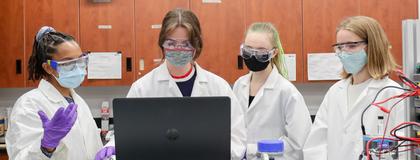
Physics Co-op Student Information
About The Program
Physics is concerned with the fundamental studies of the interaction of matter, from the sub-atomic to the astronomic. In the Physics program, you will study the basic building blocks of matter and how the four fundamental forces of nature explain the universe. You will use computer technology to investigate probes such as nuclear magnetic resonance, X-ray and nuclear scattering. The study of molecular, nuclear, and condensed matter physics, using principles of quantum mechanics and thermodynamics, is central in the physics curriculum at Guelph.
Why Co-op?
As a co-op student, you will gain relevant work experience, build professional networks, and develop essential interpersonal skills needed to succeed in the workplace, all while getting paid and earning your university degree. Guelph’s co-op program is unique due to the exceptional level of support provided throughout the co-op experience. Students will complete a comprehensive course preparing them for the co-op employment process, and will receive guidance from a knowledgeable team of staff dedicated to their development and success.
Course Sequencing
| YEAR | FALL | WINTER | SUMMER |
|---|---|---|---|
| ONE | Academic | Academic | Off |
| TWO | Academic | Academic | Work |
| THREE | Academic | Work | Work |
| FOUR | Academic | Academic | Work |
| FIVE | Work | Academic |
Acquired Knowledge & Skills
Knowledge
Competence in basic mechanics and electricity and magnetics, as well as wave theory, circuit theory, electronics, and optics. Strong scientific programming and desktop computing expertise.
Application
Experience working with electromagnetic theory, statistical physics, quantum mechanics, wave propagation and thermodynamics. Exceptional laboratory and report-writing experience.
Sample Jobs
There is a diverse selection of jobs made available to Physics co-op students, in government, academia, and the private sector within various industries. You may conduct research, participate in literature searches, or may assist in data collection and analysis. Students may work in a laboratory and/or in an office or field environment. Below are some examples of past Physics co-op positions:
Co-op Student in Component Life Technology
The student will be involved in concept development, design, and construction of an electrochemical cell to perform measurements on surfaces under two-phase conditions, using well understood aqueous environments. The student will also perform studies related to materials degradation of alloys in aqueous environments that are relevant to steam generators in nuclear power plants.
Student Researcher
The student will formulate mixtures of natural food colour compounds with phyto-glycogen nanoparticles using high-shear and high-pressure homogenization, freeze-drying and spray drying. Other duties may include carrying out chemical analysis of colour degradation using UV-Vis spectroscopy and Dynamic Light Scattering, over longtime course experiments.
Research Assistant/Tutor
This is a twofold position requiring the student to 1) perform research duties under the direction of a scientist or engineer and 2) prepare, guide, and supervise high school students through 6 weeks of the project. Research/project areas vary each year and may include chemistry, physics, nuclear science and engineering, nanotechnology, computer science, biology, environmental science, and geology.
Additional Sample Jobs: Refinery Assistant, Space Data Specialist, Undergraduate Research Assistant, Summer Student in Applied Physics, and more.
Sample Employers*
- University of Guelph - Department of Physics, Department of Chemistry
- Canadian Nuclear Laboratories
- Mirexus Biotechnologies Inc.
- Triumf
*This shows a sample of recent co-op employers and will vary depending on employer recruitment needs. During a job search, students are encouraged to be actively engaged and are supported in establishing and maintaining their own personal contacts.
Salary Information
Students receive compensation from their employer for co-op work terms. The rate of pay will vary depending on a number of factors including the industry, the student’s program of study, and work term level. For your reference, a Co-operative Education Salary Guide is available on our website, which provides hourly rates (averages and ranges) for each degree program.
